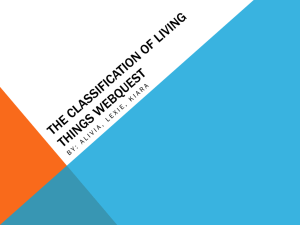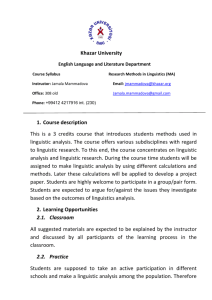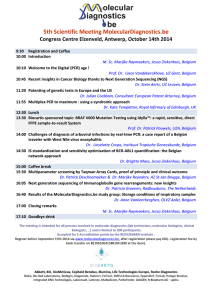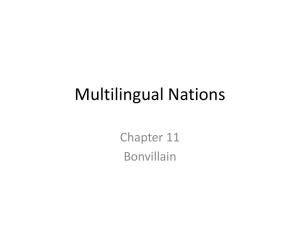Model Conference of the Faculty of International Relations
advertisement
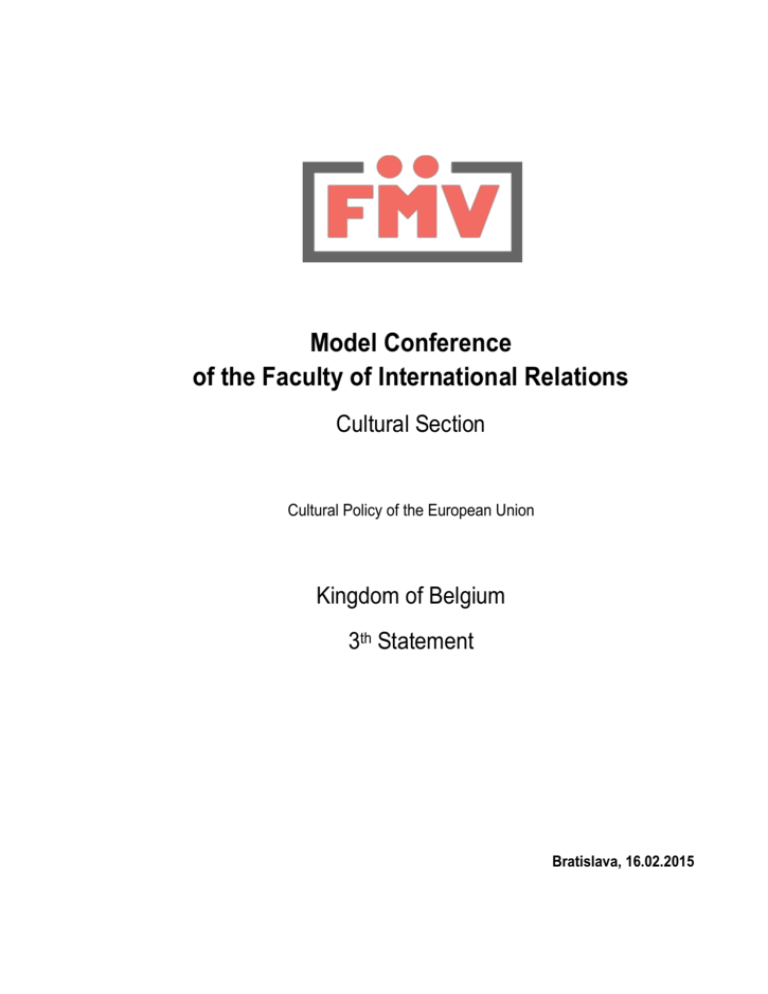
Model Conference of the Faculty of International Relations Cultural Section Cultural Policy of the European Union Kingdom of Belgium 3th Statement Bratislava, 16.02.2015 Model Conference of the Faculty of International Relations Cultural Section: 3th Statement, Kingdom of Belgium Model Conference of the Faculty of International Relations on the Cultural Policy of the European Union In the introduction, we would like to express our enthusiasm to renegotiate the current issues in cultural section. We are honored to participate in the forthcoming negotiations on the language policy of the European Union. We would also like to thank the delegation of Federative Republic of Germany, France, Kingdom of Belgium, United Kingdom of Great Britain and Northern Ireland and the countries of V4 - Czech Republic, Hungary, Republic of Poland and Slovak Republic, for inspiring discussions, expert opinions and existing joint conclusions, which we have achieved together at previous meetings. LEGAL BASIS Articles 2 and 3 of the Treaty on European Union (TEU) and Articles 6 and 165 of the Treaty on the Functioning of the EU (TFEU). In the area of education and training EU treaty put the Union in place to support and complement Member States to develop the European dimension in education, particularly through the teaching and dissemination of the languages of the Member States (Article 165, paragraph. 2), while fully respecting cultural and linguistic diversity (Article 165 paragraph 1). The Charter of Fundamental Rights, adopted in 2000, which is under the Lisbon Treaty legally binding, requires the Union to respect linguistic diversity (Article 22) and prohibits discrimination on grounds of language (Article 21). Respect for linguistic diversity is a core value of the EU as well as respect for the person and openness towards other cultures. The EU institutions respect the principle of linguistic diversity and in contact with citizens: every citizen of the Union may "write to any institution, body, office or agency referred to in this Article" (Article 24 TFEU) "or in Article 13 of the Treaty on European Union in one of the languages referred to in Article 55. 1 TEU and have an answer in the same language "(Article 24 TFEU). . Based on the legal analysis of the founding treaties of the European Union, we therefore consider that the costs associated with this type of administration can not curtail. Right of EU citizens to communicate with European institutions must be maintained. We propose to find a fair distribution of the cost of translation services between all Member States. Languages are an important priority for the European Union. Language is an integral part of our identity and the most immediate expression of culture. In Europe, linguistic diversity is a fact of life. In the EU, which is based on "unity in diversity" is the ability of individuals, organizations and companies communicate in several languages necessity. Foreign language is seen as one of the basic skills you need to reach all EU citizens to improve their chances of education and employment in the learning of European society, in particular the use of the right to free movement. -2- Model Conference of the Faculty of International Relations Cultural Section: 3th Statement, Kingdom of Belgium STRATEGIC FRAMEWORK 2020 Multilingualism and linguistic diversity are sometimes conflicting policy agendas. Language learning policy has tended to be influenced by ‘harder’ priorities like economic competitiveness and labour market mobility, and linguistic diversity policies by ‘softer’ issues like inclusion and human rights. We are trying to find a middle path that will take into account the basic requirements - national interests, efficiency in communication, spending cuts, and all within the European Union legislation. The European Union in its efforts to promote mobility and intercultural understanding designated language learning as an important priority and funding many programs and projects (for example Erasmus, Erasmus+, Youth on the Move). The EU considers multilingualism as an important element of competitiveness. One of the objectives of the language policy is to ensure that every European citizen can speak in their mother tongue and two other languages. The strategic framework for education and training in 2020, language training set as a priority. Communication in foreign languages is one of the eight key skills that are needed to improve the quality and efficiency of education and training. In addition to the basic ability to communicate in their mother tongue, this also includes the ability to mediation and intercultural understanding. EU policies in the field of education is increasingly governed by the Europe 2020 strategy in this context, language skills critical for initiative Agenda for new skills and jobs, while increasing employment. They are also a prerequisite for mobility and hence the successful implementation of the new flagship initiative Youth on the Move. THE KINGDOM OF BELGIUM AS ROLE MODEL The Kingdom of Belgium has often been called a role model for the linguistic future of Europe because of its alleged success in granting equal rights to its French and Dutch language communities while preserving political unity. Non-violent conflict between the language communities, however, has been part of public life in Belgium for decades. Present-day Belgium has three official languages: Dutch with about 5.2 million speakers, French with about 4.6 million speakers and German with about 72,000 speakers. Multilingualism is rather common in Brussels. This holds true for French–Dutch bilingualism but even more for the knowledge and use of other languages - English as the lingua franca of our times. For the above reasons, we are very pleased that we were able to push the idea of trilingualism. English, German and French are statistically the most widely used in European Union as foreign languages and it is the main reason, why these languages are an appropriate choice for working languages in the European institutions. -3- Model Conference of the Faculty of International Relations Cultural Section: 3th Statement, Kingdom of Belgium COSTS In the issue of language policy we need to focus on the financial aspects of its implementation. On the present, In the European Parliament, all EU languages equally important: all parliamentary documents are translated into all official EU languages, and every Member of the European Parliament has the right to speak in the official language of their choice. . In the following discussion, we would like to enforce the idea of trilingualism also in the European Parliament due to cost reduction. As is clear from the strategic framework of the European Union, is designed to ensure that every EU citizen spoken mother tongue and two foreign. Members of European Parliament would be an example for all citizens and one of their core competencies should be linguistic ability to defend its interests in one of the three above-mentioned languages. Finally, we would like to thank for creating space for exchange of views and we believe in successful early negotiations within the Model conference of the Faculty of International Relations in Bratislava. In Bratislava, 16.02.2015 Model Conference of the Faculty of the International Relations Delegation of the Kingdom of Belgium -4-




